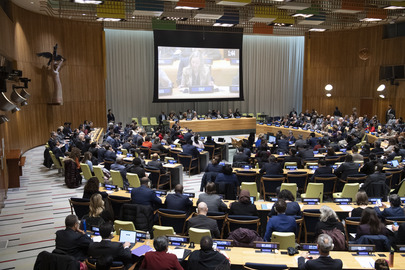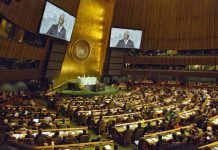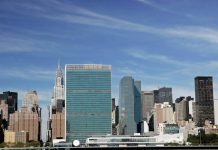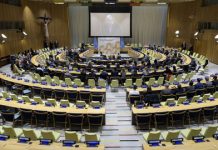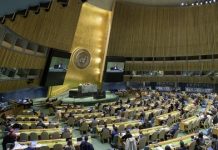Outlining his proposal at the General Assembly’s Fifth Committee, the forum for administrative and budgetary matters, António Guterres said the proposal for UN’s regular budget comes with a sense of urgency, amid multiplicity of challenges.
“In a context of major global shocks, the United Nations is more needed than ever,” he said.
The proposal reflects the priorities set out in recent landmark agreements, he emphasised, citing the Pact for the Future and its annexes, the Global Digital Compact, and the Declaration on Future Generations.
“[These] represent a commitment towards updating and reforming international cooperation to make it more networked, effective, fair and inclusive,” he added.
The regular budget (RB) encompasses UN programmes spanning various domains, such as political affairs, international justice and law, regional cooperation for development, human rights and humanitarian affairs, and public information.
Organization maintains a separate budget for peacekeeping operations, which follows a fiscal cycle from July 1 to June 30, while the regular budget aligns with the calendar year.
Budget highlights
Excluding the Special Political Missions (SPMs), the proposed budget for 2025 includes a total of 10,494 posts, representing a net increase of 115 posts for new or strengthened mandates.
$711 million is proposed for SPMs, reflecting a $31 million decrease due to the discontinuation of field operations in Sudan (UNITAMS) and the investigative team in Iraq (UNITAD).
The budget proposal also includes, among other programmes, $50 million for the Peacebuilding Fund to address ongoing funding gaps; an increase of $8 million for the UN human rights office, OHCHR, to support regional initiatives; and an additional $8.3 million to support the work of the Independent Institution on Missing Persons in Syria.
The proposed budget further includes $3.5 million in additional humanitarian resources for the crisis Gaza, including an increase of $2.5 million for the UN Relief and Works Agency (UNRWA), a lifeline for Palestine refugees.
The 2025 budget proposal also includes measures to place the System-Wide Evaluation Office on firmer footing with RB funding, alongside a $2 million increase for the Office of Internal Oversight Services (OIOS) and the Ethics Office to bolster capacities.
Focus on development
Sustainable development remains a core priority, with an increase of about $4.5 million, marking the sixth consecutive annual increase.
The Regular Programme of Technical Cooperation (RPTC) will receive a $2 million boost, and an additional $500,000 is proposed for technical assistance and advice to nations on the 2030 Agenda for Sustainable Development and African Union’s Agenda 2063.
The proposal also includes an increase of $1 million for the Development Account to enhance targeted, country-level support.
Mr. Guterres also highlighted the “chronic funding shortfall” facing the Resident Coordinator system and need for “a sustainable and predictable funding mechanism”, through partial RB financing.
Liquidity challenges
Mr. Guterres concluded by urging Member States to fulfil their financial obligations in full and on time, stressing that the UN’s ability to meet its mandates depends on the availability of funds.
He explained that the Organization started 2024 with only $67 million in cash, down from $700 million the previous year, “making it extremely vulnerable to adverse changes in payment patterns of assessed contributions”.
To stave off implementation constraints next year, Mr. Guterres proposed that the General Assembly temporarily suspend the return of credits for 2023 against the 2025 assessment. The credits would be held in a reserve and released as conditions improve.
“Ultimately, the effectiveness of programme delivery and use of financial resources in 2025 will depend on the availability of cash,” he said.
Source of original article: United Nations (news.un.org). Photo credit: UN. The content of this article does not necessarily reflect the views or opinion of Global Diaspora News (www.globaldiasporanews.com).
To submit your press release: (https://www.globaldiasporanews.com/pr).
To advertise on Global Diaspora News: (www.globaldiasporanews.com/ads).
Sign up to Global Diaspora News newsletter (https://www.globaldiasporanews.com/newsletter/) to start receiving updates and opportunities directly in your email inbox for free.


